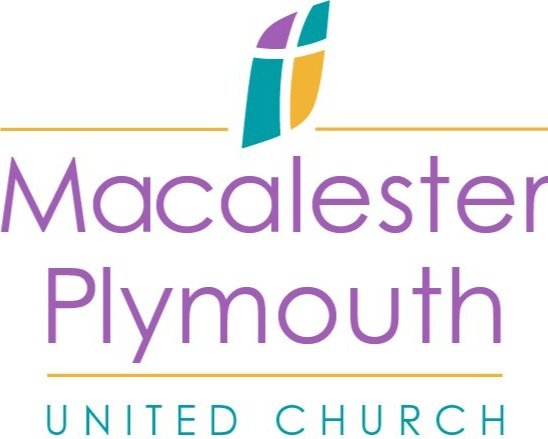Land Acknowledgement
Our Land Acknowledgement Statement
Macalester Plymouth United Church stands on the ancestral and contemporary homeland of the Dakota people. The nearby confluence of the Mississippi and the Minnesota Rivers, called Bdote, is the sacred Dakota place of genesis.
We acknowledge the Christian origins of the Doctrine of Discovery and its adoption by the Supreme Court of the United States in the early years of the nation. That doctrine facilitated the seizure of Indigenous lands, the expulsion of Indigenous persons from those lands, and the subjugation and eradication of Indigenous persons. The Doctrine of Discovery remains embedded in American Law.
We acknowledge that, only a few decades before our congregation acquired its first land, the United States forced the Dakota people off this land by unconscionable and broken treaties, by killing, imprisoning, and expelling the Dakota from their homeland. Although we did not participate in the theft of this land or the other atrocities, we have benefited from these cruel and dishonest deeds.
We acknowledge that the treaties with the Indigenous people of Minnesota continue to be broken, threatening native sovereignty, and causing irreparable harm to native lands and waters.
We acknowledge that Christian churches, including the Congregational Church and the Presbyterian Church, played an instrumental role in the establishment of Indian Boarding Schools, whose stated intent was to civilize and Christianize Indigenous children. Indian Boarding Schools forced the removal of children from their families, stripping them of their native languages, religious practices, and cultural connections. From the time of its founding, in 1887, Macalester Presbyterian Church and its Women’s Missionary Society actively raised funds for Indian Boarding Schools through the Presbyterian Board of Home Missions. We acknowledge the continuing intergenerational trauma caused by Indian Boarding Schools.
We acknowledge that one of the ministers who preached frequently at Macalester Presbyterian Church in its earliest years promoted anti-Indigenous policies, denigrated Native Americans, and advocated for forced assimilation. We acknowledge that these harmful and hateful beliefs and practices are part of our history, and we reject them.
While we now acknowledge these truths, the harm remains. The Presbyterian Church (USA), the United Church of Christ, and many other churches, including the Catholic Church, have formally repudiated the Doctrine of Discovery, but the pain persists. Our words alone, our acknowledgements and repudiations, cannot repair the damage done by the theft of land, the genocide, the forced removal of children from their homes, and the attempted erasure of culture.
We are called to move beyond words and to take action. We pledge our energy and resources to seeking justice and to walking in solidarity with our Indigenous neighbors. For details about actions we are currently taking, please see the Antiracism page of the church website.
This statement will be revised from time to time as our understanding evolves and as we engage more fully with Indigenous communities.
Shorter Land Acknowledgement Statement
(Used monthly in worship)
We gather today on the homeland of the Dakota people. We acknowledge the role Christianity played in removing the Dakota people from their sacred land. We also acknowledge the historical role churches, including our denominations, played in establishing boarding schools designed to erase Indigenous culture. We honor the Dakota, the Anishinaabe, and our other Indigenous neighbors. We pledge to learn from them and to walk in solidarity with them.
These statements were written by the Indigenous Justice Team and approved by the Session in September of 2023.
For us, Land Acknowledgement includes a commitment to:
Educate ourselves and our community about Indigenous justice;
Build relationships with Indigenous organizations in our community,
such as the Department of Indian Work, Wakan Tipi Awanyankapi,
and the National Native American Boarding School Healing Coalition;
Join with native groups in advocacy for equitable public policies;
Explore how to build a financial commitment to reparations into the
church budget.
The Minnesota Conference United Church of Christ is publishing a series of articles looking back at the history of the First People in Minnesota. This is an excellent series and provides bite sized windows into this important and troubled history. Click the links below to read the articles.


